We are now on the edge of a Coronavirus surge in Ireland. The number of cases is rising sharply every day.
Assuming we follow the same trajectory as other European countries like Italy and Spain -- and even though we are a few weeks behind them we are unlikely to be different -- then we are going to reach a critical stage here very quickly. By the time you read this, that may already be underway.
At the start of this week, we moved from limited to widespread testing, so we could see the number of cases go from 200 to 2,000 in the coming days as more infected people are identified.
Read more: “We are in this together” - Irish leader delivers historic State of the Nation on March 17
The government says we have moved from the containment phase to the delay phase. In other words, the spread of the disease cannot be contained, only slowed down.
The number of cases may still be lessened somewhat if people are meticulous in how they wash hands, avoid touching the face, keep a two-yard social distance at all times and, for the vulnerable, self-isolate.
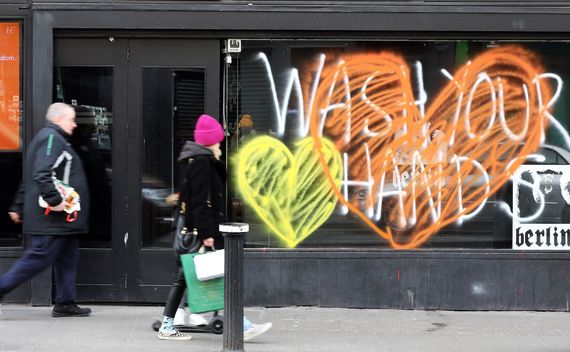
"Wash your hands" graffiti on Dame Lane, in Dublin 2.
With that in mind, schools, colleges, childcare facilities, bars, and restaurants are closed, St. Patrick's Day festivities have been canceled, tourist attractions are shut, theaters and cinemas are closed, crowds are forbidden, sporting events have been postponed and everyone is being urged to follow the advice on how to avoid getting and spreading the disease.
But whatever we do, we are going to see thousands of cases here in the coming weeks and many deaths. It's a terrifying reality. The fear is everywhere and palpable.
Even people who a week ago were making nervous jokes about the virus are no longer laughing. Everyone is frightened, including myself since I fall into the vulnerable category of "older, with a pre-existing medical condition."
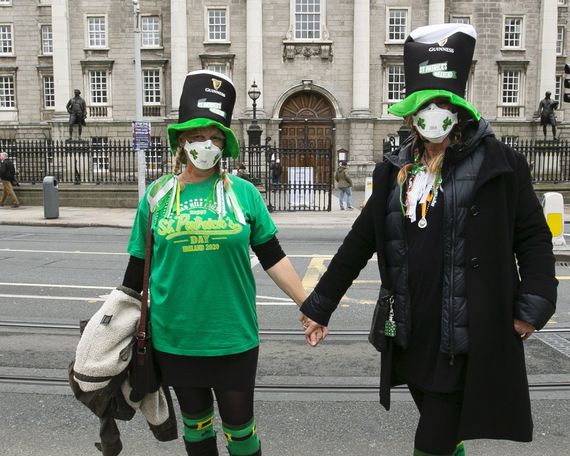
Tourists out in Dublin on St. Patrick's Day.
In the last few days, health officials have been warning that many people here have not been taking the situation seriously enough and are thereby putting everyone else at risk. We saw some appalling examples of this last week.
When the colleges were closed, students packed into bars to have virus parties. And it wasn't just students. Videos online showed many pubs were as full as ever with their usual customers crowded together.
After a few drinks, no one was observing the social distance advice. In smaller bars, there was no room to do so anyway. It's no surprise the government last weekend told all the pubs and bars to close.
Even worse was the 20,000 Irish horse racing fans who went as usual to the four-day Cheltenham Festival in England last week, even though the virus there is worse than here. The decision by the U.K. government to let this annual jamboree go-ahead was madness since other outdoor events like football matches were being canceled.
Read more: #ICKindess - Do you know a local hero helping others deal with coronavirus?
But the U.K. decision does not absolve the Irish who went there from blame. They were stupid to do so, even though Cheltenham is a sacred trip every year for many Irish racing fans.
They were packed into stands, bars, and hotels over there and are now back home all over the country, which shows an appalling disregard for everyone else. The reaction has been caustic, with critics online suggesting that if they develop the virus they should be refused treatment.
That is unlikely to happen. But the insistence on going to Cheltenham and the number of people at home still crowding into pubs last week were an unflattering illustration of how our addiction to "having the craic" can be an excuse for very stupid behavior. In this case, it could well be behavior with deadly consequences.
The closure of schools and colleges last week was a wake-up call for many people here which prompted an immediate rush to supermarkets to stock up on essentials. There were long lines for the checkouts and trollies piled high with cereal boxes, potatoes, pasta, canned food, and toilet rolls. The shelves where you usually find hand sanitizer bottles and wipes, soap, disinfectant sprays, and liquids were stripped bare. It was all relatively good-humored but there was an underlying note of panic in the air.
The closure of creches and pre-schools is creating severe problems for all those families where both parents work. When too many of these parents brought their kids to public playgrounds they were closed as well. The reason is that children can be carriers of the disease without showing symptoms and can infect other kids and adults, particularly grandparents who may be asked to babysit them.
As we are quickly learning there are no simple answers in all of this and there are differences of opinion even among scientists and health experts. That is why the U.K., so far, has followed a slightly different path to Ireland (and much of Europe) in dealing with the virus.
The U.K. has kept schools open, believing that closing them has negative consequences that are not immediately obvious. Despite this, however, Britain is expected to close both schools and bars in the coming days.
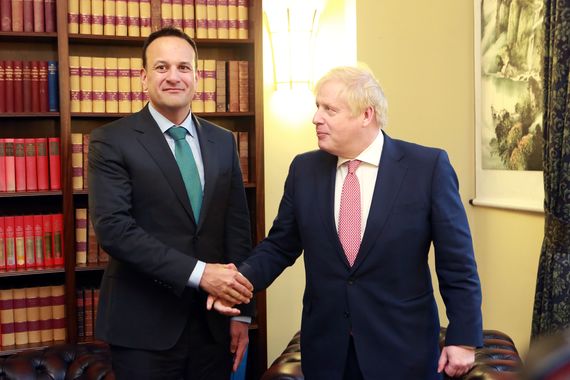
Irish leader Leo Varadkar and British Prime Ministers Boris Johnson.
The difference in policy between us and the U.K. has led to an odd situation along the border with Northern Ireland, with schools on the Republic side closed but schools a few miles away in the North open. Obviously this makes little sense and Sinn Fein has demanded that schools in the North be closed immediately.
The U.K. scientific advice appears to favor an acceptance that up to 80 percent of people in the U.K. will get the disease and that this will build a so-called "herd immunity" in the population which will prevent further outbreaks in the future.
Instead of trying to stop this, they believe resources should be concentrated on treating the minority of people who become very ill, mainly older folk with underlying medical conditions. They also favor moves to delay the spread of the disease so hospitals are not overwhelmed.
This is also the policy here. We have to avoid a catastrophic spike in the number of people needing intensive care at the same time. The aim is to "flatten the sombrero" -- to level off the graph of expected patient numbers by spreading them out over a longer period, probably months.
Whether the more aggressive approach we (and other countries in Europe) are taking is better than the one being adopted in the U.K. will not be known for some time.
Ireland is not in lockdown like much of Italy and Spain, at least not yet. We are still free to move around Dublin city and the rest of the country, buses, and trains are running and the airports and sea ports are still open.
Of course, all that could change quickly if there is an alarming jump in cases and we could see deserted streets and cities in lockdown like in Italy and Spain.
Last weekend there were still quite a few tourists around Dublin in the run-up to the now-canceled St. Patrick's Day celebrations. With the Guinness Storehouse and the Book of Kells exhibit in Trinity closed, as well as all the pubs in Temple Bar, there was not much for them to do.
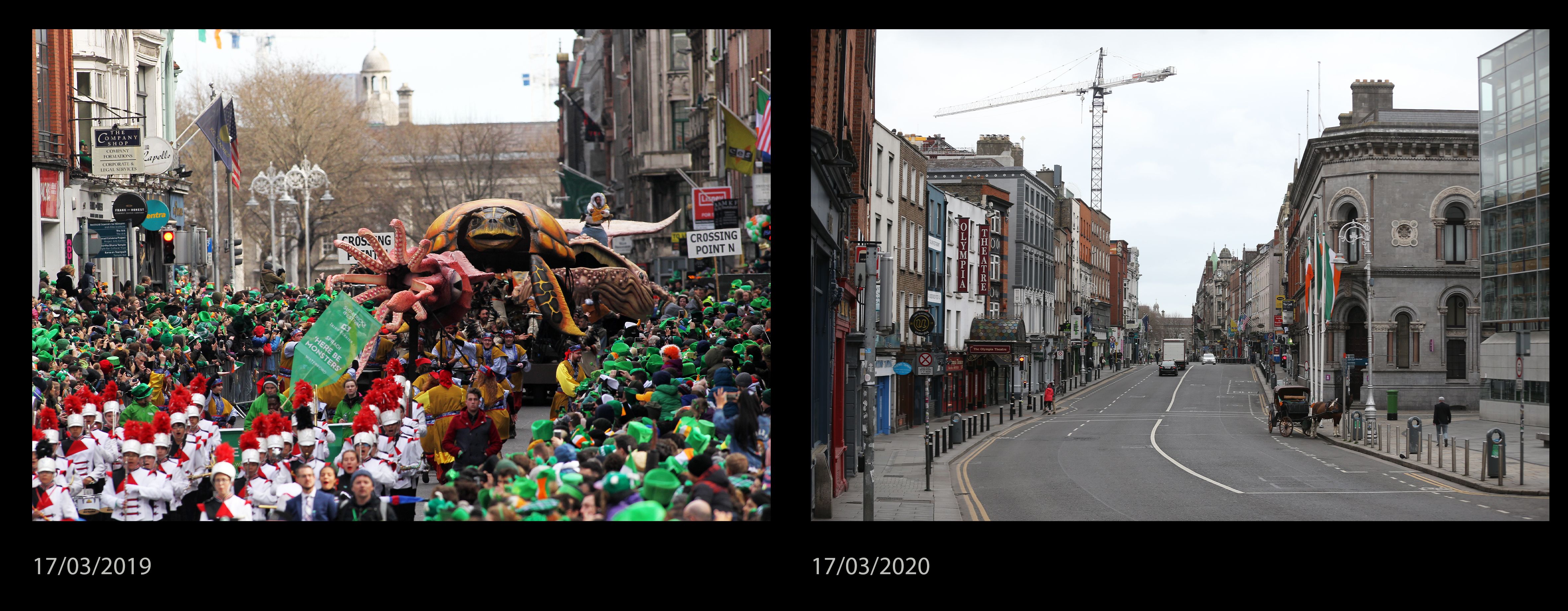
Dame Street, Dublin, on St. Patrick's Day: 2019 versus 2020.
Whether we should have moved faster to restrict travel is still a bone of contention here. Instead of doing so, the government and the health experts have been issuing travel advice, asking rather than telling people what to do and listing countries where it is not sensible to go.
So far this voluntary approach appears to be working (if you ignore the clowns who still went to Cheltenham and continued to cram into pubs at home). Requesting public cooperation has been the approach rather than using state power which can never be completely successful given the scale of the challenge we face.
Emphasizing again and again that we are all in this together seems to be a better way of getting people to take responsibility, to modify their behavior and take ownership of the dreadful situation. It's the only way we're going to get through it.
From this side of the pond, what has been happening in the U.S. is particularly worrying. Given the lack of testing and the unknown extent of the virus spread there it seems likely that the U.S. is sitting on a time bomb that's about to go off. There is likely to be a dramatic increase in cases in the coming weeks and there are serious doubts about whether the White House will be able to handle the situation or has prepared the public adequately with consistent and accurate information.
Whatever about his performance on the economy, this crisis has exposed President Trump as clueless and devoid of any substantive leadership quality. His fumbling indecision means he has been unable to reassure America that he is up to the challenge of what lies ahead.
This is one situation in which America First is not a policy. Trump wearing his America hat is not only deeply insensitive but inappropriate and misguided. This is a global catastrophe we are facing and it needs all countries to work together to succeed.
Just stopping flights and boasting about closing the borders is not going to be enough. If the virus gets out of control in the U.S. and that happens after Europe passes its peak and begins to come out the other side we could see Europe banning flights from the U.S. rather than the other way round. On Monday the head of the EU Commission called for a 30-day ban on non-essential flights into the EU.
Read more: Coronavirus live updates - 292 confirmed cases in the Republic of Ireland
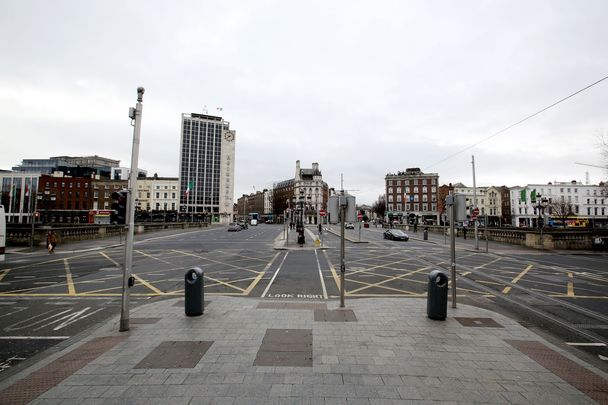



Comments